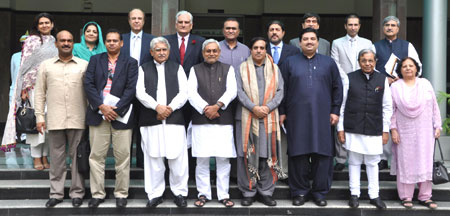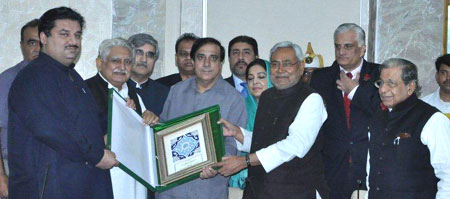|
|
| |
| EVENTS |
|
|
> Peace and Friendship for Good Governance
By Ahmed Bilal Mehboob * |
|
|
| |
Nitish Kumar, Chief Minister of India�s fastest growing State, Bihar, is on a week-long visit to Pakistan with a 10-member delegation at the invitation of Chief Ministers of Sindh and Punjab. |
|
| |
Earlier, a 10-member Pakistan Parliamentary delegation comprising PPP, PML-N, ANP and MQM MPs had visited Patna, Bihar, in August 2012 where Nitish Kumar warmly received and personally briefed them about his government�s initiatives and performance. Pakistani MPs were intrigued by Bihar�s �growth miracle� and wanted to learn for themselves how Bihar managed a turn-around, within a short span of time, from being one of the poorest and most poorly-governed to the fastest growing State of India with several innovative measures of good governance. Pakistani MPs, most of all, wanted to learn how Bihar�s lessons could be applied in Pakistan.
|
|
| |
Bihar, with a population of 103 Million, is the third most populous State of India after UP and Maharashtra. About 17 % population is Muslim which makes Bihar host to the second largest population of Muslims among the Indian States. Bihar had posted a compound annual growth rate of 16.71 % during 2011-12 which was the highest among the Indian states. Bihar�s spending on development tremendously increased during the past 5 years with the expenditure during this period being higher than the cumulative expenditure during the preceding 50 years. |
|
| |
Bihar�s landmark governance initiative has been passing the Right to Public Service Act in 2011 which guarantees 52 basic services to its citizens within a fixed timeframe. Citizens can demand these services as a right and penalties are prescribed for public office holders who fail to provide these services within the prescribed time limit. The State received some 20 million (2 crore) applications during the one year period after the passage of the Act of which some 95 % were disposed off within the target time. |
|
| |
Another innovation of Bihar is providing the Right to Information (RTI) to the most marginalized and illiterate sections of society which cannot make written applications to demand information. Now any citizen can file an application for information using mobile phones and the State is under obligation to provide requested information within 30 days. A number of call centres have been established in Bihar to convert public calls into written RTI applications. It is worth noting that Right to Information has assumed the scale of a movement in India and is extensively used by citizens to demand not only information but also good governance. |
|
| |
Pakistan, which faces tremendous challenges in vaccination of children, especially Polio, can also learn a lot from Bihar which has succeeded in increasing the percentage of full immunization from 18.6 % in 2005 to 66.8 % in 2012. No fresh case of Polio has been detected in Bihar since September 2010.
While Shahbaz Sharif can share his experience of distribution of free laptops among top students, Nitish Kumar can discuss the impact of providing free bicycles to all class 9th students. This exchange of experience between Chief Ministers of Sindh and Punjab with Chief Minister of Bihar is expected to have a much more direct relevance to people�s lives and good governance in the region. |
|
| |
Pakistan and India have discussed issues like Kashmir, Siachin, River Water, Trade and Terrorism for many years; and this dialogue should continue. However, basic public issues like Education, Health, Poverty Eradication, Right to Services, etc. are new and welcome items on the menu.
As Nitish Kumar completes his second consecutive term as CM after serving 6 terms in the Lok Sabha and holding portfolios of Union Cabinet Minister of Railways, Surface Transport and Agriculture, he is being widely tipped as one of the most potent candidate for the future Premier of India. It is a measure of his success that after serving his first 5-year term as CM, he was swept back to power in Bihar in 2010 with a record four-fifth majority. |
|
| |
His visit to Pakistan and exchange of views with top political leaders will provide him with necessary insight into Pakistan-India relations. Both Pakistani hosts and Indian guests are expected to benefit a great deal by sharing their respective experiences in politics and governance.
Now that Pakistan is transforming itself into a stable democracy, the challenges of providing good governance under a democratic set up may be easier to face by learning from each other. The goals of peace and friendship can be achieved not only by holding dialogues on bilateral issues but also by sharing of experiences on good governance. This is a new mission on which three Chief Ministers of India and Pakistan are embarking. They deserve to be wished Good Luck. |
|
| |
* The writer is the President of Pakistan Institute of Legislative Development And Transparency � PILDAT which facilitated the visit of Pakistani Parliamentarians to Patna, Bihar in August 2012. |
|
| |
|
|
| |

|
|
| |
|
|
| |

|
|
|
|
|
|
|
|
|